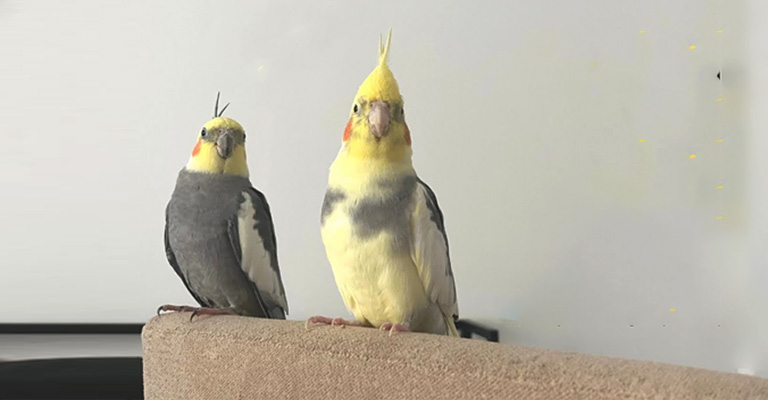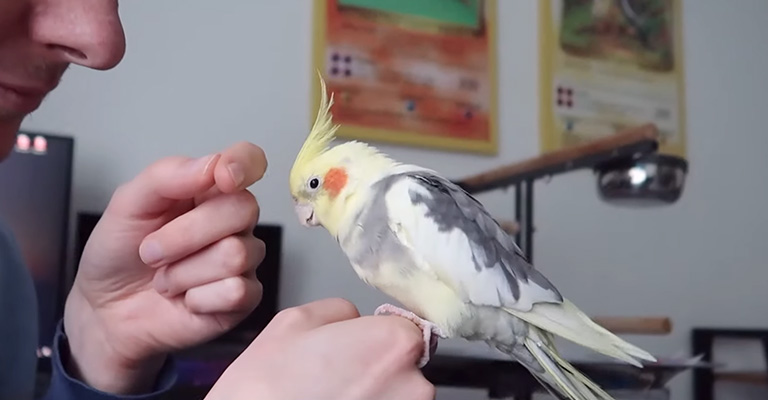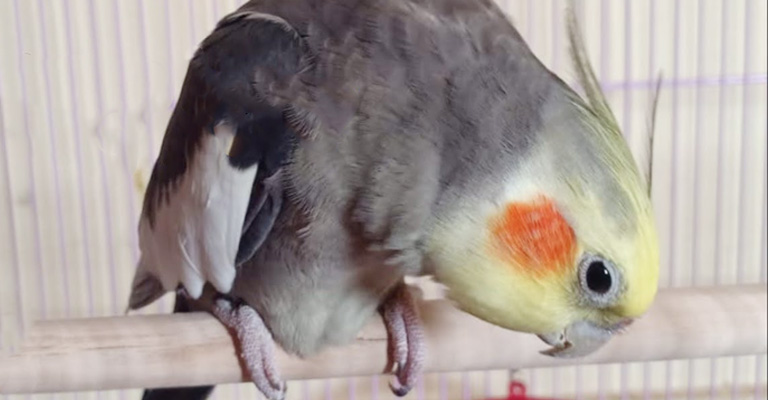Cockatiels, those charming and colorful parrots, have a wide range of vocalizations that they use to communicate with their owners and fellow feathered friends.
Among their repertoire of chirps, squawks, and whistles, there’s one intriguing sound that often leaves bird enthusiasts puzzled – the cockatiel “toot.”
If you’re a proud cockatiel owner, you’ve likely heard this unique noise emanating from your feathered companion at some point. In this article, we’ll dive into the fascinating world of cockatiel vocalizations, exploring ‘What does my cockatiel’s ‘toot’ sound mean’ and what triggers it.
We’ll explore various scenarios in which cockatiels emit this sound, decode its potential meanings, and provide you with insights to better understand and bond with your beloved cockatiel.
So, let’s embark on this avian auditory adventure and uncover the secrets behind your cockatiel’s ‘toot’! Together we’ll discover all the fascinating facts about cockatiel calls.

What Does My Cockatiel’s ‘Toot’ Sound Mean?
In this section, we’ll delve into the world of cockatiel vocalizations, with a specific focus on the elusive ‘toot’ sound.
We’ll explore various scenarios in which cockatiels emit this sound, decode its potential meanings, and provide you with insights to better understand and bond with your beloved feathered friend.
The Melodic Mystery of the Cockatiel ‘Toot’
Cockatiels are prized for their ability to mimic sounds, from whistling tunes to mimicking household noises.
However, the ‘toot’ sound often leaves bird enthusiasts and even experienced cockatiel owners perplexed. To decipher this intriguing vocalization, we must first understand the context in which it occurs.
The Context of the ‘Toot’
The ‘toot’ sound typically emerges during moments of relaxation and contentment. Many cockatiels produce this noise when they are comfortably perched, often fluffed up and content.
It is frequently associated with a bird in a state of serenity. Think of it as the avian equivalent of a satisfied sigh.
The ‘Toot’ as a Social Signal
Cockatiels are highly social birds that thrive on interaction with their owners and fellow birds. The ‘toot’ sound can serve as a social signal, especially when directed towards their human companions.
It is not uncommon for a cockatiel to emit a ‘toot’ when you approach them or when they are seeking your attention. It’s their way of saying, “I’m here, and I’m ready to engage with you.”
Expressing Contentment and Relaxation
Cockatiels, like humans, have moments of pure relaxation and contentment. When your cockatiel is perched in a comfortable spot, basking in the warmth of their environment, or enjoying a head scratch from you, they may emit the ‘toot’ sound.
This vocalization is akin to a blissful sigh, indicating that your feathered friend is feeling safe and content.
The ‘Toot’ During Bath Time
Cockatiels are renowned for their love of bathing. When they indulge in their favorite water activities, you might notice them producing the ‘toot’ sound.
This is often a sign of sheer joy and delight. Bath time is not just about cleanliness for cockatiels; it’s a moment of exuberance, and the ‘toot’ reflects their sheer pleasure.
The ‘Toot’ as a Sign of Trust
Trust is a crucial element in the bond between you and your cockatiel. When your feathered companion emits the ‘toot’ sound in your presence, particularly when perched on your shoulder or hand, it’s a clear indication of trust and comfort.
They feel safe and secure with you, and the ‘toot’ serves as a confirmation of this trust.
Decoding the ‘Toot’ in Group Settings
Cockatiels are social birds, and they often live in flocks in the wild. In a group setting, the ‘toot’ sound can serve various purposes. It can be a way to communicate with other cockatiels, a sign of camaraderie, or even a form of expressing excitement or curiosity within the flock.
The ‘Toot’ and Individual Variation
It’s important to note that each cockatiel has its unique personality and vocalization patterns. While the ‘toot’ generally conveys positive emotions, the specific meaning can vary from one bird to another.
Understanding your individual cockatiel’s behavior and context is key to interpreting their ‘toot’ accurately.
How Do I Respond to My Cockatiel’s ‘Toot’ Sound?

Responding to your cockatiel’s ‘toot’ sound is a wonderful way to strengthen your bond and engage with your feathered friend. Here are some tips on how to respond:
Acknowledge and Interact
When your cockatiel ‘toots’ in your presence, take it as an invitation to engage. Offer them attention, speak to them in a soothing tone, and consider gentle petting or scratching their head if they enjoy it. This reassures them that you are responsive to their communication.
Positive Reinforcement
When your cockatiel ‘toots’ during desired behaviors, such as perching calmly or during playtime, respond with positive reinforcement. Offer them a small treat or their favorite snack.
This associates the ‘toot’ with positive experiences, encouraging them to continue using it as a form of communication.
Respect Their Space
While it’s essential to engage with your cockatiel when they ‘toot,’ also be mindful of their boundaries. Some cockatiels may prefer to be observed rather than touched when they vocalize in this way. Respect their comfort level and adjust your response accordingly.
Provide Comfort
If your cockatiel ‘toots’ while perched comfortably, ensure that their environment remains calm and peaceful. Maintain a tranquil atmosphere to reinforce their sense of security and contentment.
Enjoy Bath Time
If your cockatiel ‘toots’ during bath time, consider extending their playtime in the water. This not only responds to their communication but also enhances their enjoyment and contributes to their overall well-being.
Respect Trust
If your bird ‘toots’ when perched on you, acknowledge their trust and continue to be a reliable and caring companion. Maintain a gentle and nurturing presence to reinforce their sense of security.
Remember that each cockatiel is unique, and their preferences may vary. Pay close attention to your individual bird’s reactions and adjust your response accordingly.
The key is to create a positive and nurturing environment that strengthens the bond between you and your feathered companion, all while enjoying the charming melodies of their ‘toot’ communication.
What Other Sounds Cockatiels Make?

Cockatiels are known for their diverse and often charming repertoire of sounds and vocalizations. Here are some of the common sounds and noises you might hear from your cockatiel:
Whistles and Chirping
Cockatiels are excellent whistlers and can mimic various tunes and melodies. They may learn to imitate songs or even create their own unique whistles.
Chirping is a regular part of a cockatiel’s communication. They use different types of chirps to convey different messages, from expressing contentment to signaling distress.
Squawking and Screeching
Cockatiels can produce loud, high-pitched squawks, often when they are excited, alarmed, or seeking attention.
Screeching is a more intense and piercing noise compared to squawking. Cockatiels may screech when they’re frightened, agitated, or upset.
Mimicking Sounds and Clicking
Cockatiels have a remarkable ability to mimic sounds from their environment. They might mimic doorbells, phone ringtones, microwave beeps, or even the sound of a pet dog or cat.
Some cockatiels make a soft clicking sound as they grind their beaks together. This is usually a sign of contentment and comfort.
Hissing and Talking
Although less common, some cockatiels may hiss when they feel threatened or defensive. It’s their way of warning potential intruders.
While not as proficient as larger parrot species, some cockatiels can learn to say a few words or phrases. They might also mimic laughter or other human sounds.
‘Toot’ and Contact Calls
As discussed earlier, the ‘toot’ is a unique and often mysterious sound that cockatiels make when they are content and relaxed.
Cockatiels have contact calls they use to locate other birds or their owners when they are out of sight. These are usually soft and repetitive sounds.
Courtship Sounds and Alarm Calls
During courtship and breeding behavior, cockatiels may engage in specific sounds and gestures to attract a mate. These sounds can vary among individual birds.
When cockatiels perceive a potential threat or something unusual in their environment, they may emit alarm calls to alert their flock or owner.
Understanding the various sounds your cockatiel makes and the context in which they occur is essential for effective communication and building a strong bond with your feathered friend.
It’s also important to note that individual cockatiels can have unique vocalizations, so getting to know your bird’s specific sounds is part of the joy of cockatiel ownership.
FAQs
What should I feed my pet cockatiel?
Cockatiels should have a balanced diet that includes high-quality pellets, fresh vegetables, and occasional fruit treats. Additionally, they require a source of calcium, like cuttlebones or mineral blocks, to maintain their beak and bone health.
How can I tame and socialize my cockatiel?
Taming and socializing a cockatiel requires patience and consistency. Spend time with your bird daily, offering treats and gentle interactions. Gradually increase physical contact as your cockatiel becomes more comfortable with you.
Do cockatiels talk like larger parrots?
Cockatiels can learn to mimic words and phrases to some extent, but they are not as proficient as larger parrot species. Some may develop a small vocabulary, while others may only mimic sounds or whistles.
How long do cockatiels live in captivity?
Cockatiels are relatively long-lived birds and can live for 15 to 25 years or more with proper care. Providing a healthy diet, a safe environment, and regular veterinary check-ups can help extend their lifespan.
Are cockatiels good pets for beginners?
Cockatiels are often recommended as good pets for beginners in the world of pet birds. They are generally friendly, adaptable, and relatively low-maintenance compared to some other parrot species.
However, they still require proper care, attention, and commitment from their owners.
Conclusion
While cockatiels may seem small in size, their vocalizations are anything but insignificant. The ‘toot’ sound, often dismissed as a mere quirk, can convey important messages and emotions.
Whether it’s a sign of contentment, curiosity, or even a friendly greeting, deciphering your cockatiel’s ‘toot’ can enhance your connection with these delightful birds.
Remember, each cockatiel is unique, and the context of the ‘toot’ matters just as much as the sound itself. By observing your feathered friend closely and paying attention to their body language and surroundings, you can become a proficient ‘toot’ interpreter.
In the end, the melodious ‘toot’ is yet another testament to the rich and intricate world of cockatiel communication.
Embrace this special sound as a window into your bird’s heart and soul, and continue to nurture the beautiful bond you share with your charming cockatiel companion. Happy tooting!
Meta: